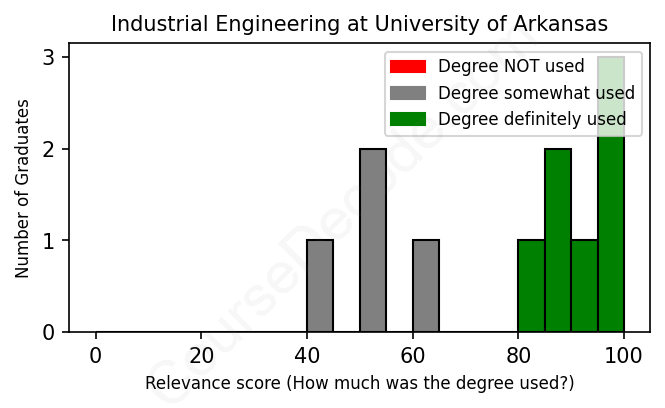
First, some facts. Of the Industrial Engineering graduates from University of Arkansas we've analyzed , here's how many have used (or NOT used) their degree in their career:

These are estimates based on AI analysis of 11 LinkedIn profiles (see below).
The verdict? Significantly above average. Overall, with an average relevance score of 78%, Industrial Engineering graduates from University of Arkansas have a much higher likelihood (+11%) of finding work in this field compared to the average graduate across all fields:
And for comparison, here's the chart for all profiles we've looked at across all degrees.
Also, after graduating, only 27% of these graduates have pursued further education other than another Bachelor's degree (such as a Masters degree or other), compared to the average across all profiles of 35%. This suggests a Bachelors degree is enough for most Industrial Engineering graduates, and it's normal to look for work straight after graduation.
See the details:
|
Relevance score: 89% We think this person has gone into a career highly relevant to their degree. We think this person has gone into a career highly relevant to their degree.
DEGREE INFOGraduated in 2018 from University of Arkansas with a Bachelor's Degree in Industrial Engineering. No other secondary education since. JOB HISTORY SINCE GRADUATIONIndustry Key Account Manager Habasit Apr 2018 - Mar 2019 Supply Chain Engineer  Marshalltown Mar 2019 - Sep 2021 Engineering Systems Manager  Marshalltown Sep 2021 - Oct 2022 ABOUTI'm a results-oriented professional with expertise in leadership, analytics, automation, and programming. As the Owner of Simple Inventory Management, LLC, I developed an inventory management and POS app for small businesses, driven by customer feedback and value.At ArcBest Technologies, I excel as a Sales Engineer, guiding customers through technology integration and maximizing ROI through data analytics. Previous roles at MARSHALLTOWN saw me leading engineering teams, automating processes, and driving cost savings.Before transitioning to the private sector, I served in the United States Marine Corps as an aircraft mechanic, honing my leadership knowledge and skills.I hold a Bachelor of Science in Industrial Engineering from the University of Arkansas, graduating with highest distinction. |
The top 10 most common jobs done by the graduates we've analyzed (ranked most common to least) are:
So, if we're looking at the common jobs for folks who studied Industrial Engineering at the University of Arkansas, it seems like many of them have landed positions that are pretty relevant to what they learned in school. A big chunk of graduates went into logistics roles at J.B. Hunt Transport Services, which makes total sense because those jobs rely heavily on industrial engineering principles like process optimization and efficiency in supply chains. Others found their way into positions at major companies like Lockheed Martin and Pratt & Whitney, where the roles consistently demand strong industrial engineering skills, making their job relevance clear. Even those who have branched out into project management or operations roles are still tapping into skills learned during their degree, especially skills related to planning and problem-solving.
However, it's not all directly on-point with industrial engineering. Some graduates have ventured into jobs that lean more towards general business or marketing and don’t necessarily call for the hardcore engineering principles they learned during their studies. For example, roles like Digital Marketing Manager or Small Business Owner don’t really tap into the technical skills of industrial engineering. So, while many are utilizing their education well, there’s definitely a mix, and some people are cruising along in careers that, while related, don’t make full use of their industrial engineering background. All in all, though, there’s a decent amount of relevance for most of them, especially in technical and engineering-related positions.
Here is a visual representation of the most common words in job titles for Industrial Engineering graduates (this is across all Industrial Engineering graduates we've analyzed, not just those who went to University of Arkansas):

Looking at the career trajectories of graduates from the University of Arkansas with degrees in Industrial Engineering, it seems like many of them are kicking off their careers in logistics, manufacturing, and engineering roles right after graduation. A lot of them are landing positions like logistics engineers, manufacturing engineers, and various engineering roles at well-known companies such as J.B. Hunt Transport Services, Lockheed Martin, and Dassault Falcon Jet. This early start in relevant jobs is a positive sign that these graduates are finding their way into roles that align closely with their field of study, which is a good foundation for their future careers.
Fast forward five to ten years, and you’ll notice that many graduates continue to progress within the engineering and logistics fields, moving up to senior and managerial roles at prominent companies. For instance, someone who started as a logistics engineer might eventually become a senior logistics engineer or even an industrial engineering manager. However, not everyone sticks strictly to traditional paths. Some graduates pivot into other domains like project management or digital consulting, showing that an Industrial Engineering degree equips them with versatile skills applicable in various industries. Overall, it looks like most of these graduates are enjoying successful and relevant careers, indicating a strong connection between their education and job market opportunities.
Getting a Bachelor’s degree in Industrial Engineering can be a bit of a mixed bag, honestly. It’s not the easiest path out there, but it’s also not the hardest if you stay on top of your game. You’ll dive into a lot of math and logic, along with some engineering principles, and you might find yourself pulling some late nights during midterms and finals. The workload can be pretty hefty, especially with projects and group work sprinkled in, but if you're organized and don’t procrastinate (which is key!), you can totally manage it. Overall, I'd say it's a challenge, but one that many students find rewarding if they're interested in the subject!
Most commonly, in the LinkedIn profiles we've looked at, it takes people 4 years to finish a Bachelor degree in Industrial Engineering.
Looking at these Industrial Engineering grads from the University of Arkansas, it seems like most of them are doing pretty well in their careers, especially the ones who graduated earlier. The first graduate has climbed the ranks at J.B. Hunt Transport Services and is now a small business owner, which can be a good way to make money if they do it right. The one from Lockheed Martin has been steadily promoted through several high-level engineering roles, which usually pay well, and now they're with Blue Origin, a super cool and likely high-paying gig. The others, while they might not have super flashy titles yet, are accruing experience in solid companies like Dassault Falcon Jet and Tyson Foods, hinting that they're on a good path. Overall, it looks like they’re moving toward decent salaries, especially given the positive trajectory in their careers!
Here is a visual representation of the most common words seen in the "about" section of LinkedIn profiles who have a Bachelor degree in Industrial Engineering (this is across all Industrial Engineering graduates we've analyzed, not just those who went to University of Arkansas). This may or may not be useful:

Here are all colleges offering a Bachelor degree in Industrial Engineering (ordered by the average relevance score of their Industrial Engineering graduates, best to worst) where we have analyzed at least 10 of their graduates:
| College | Score | Count |
|---|---|---|
 Iowa State University Iowa State University
|
88 | 11 |
 North Carolina State University North Carolina State University
|
87 | 12 |
 California Polytechnic State University-San Luis Obispo California Polytechnic State University-San Luis Obispo
|
87 | 15 |
 Texas A&M University Texas A&M University
|
83 | 39 |
 Purdue University Purdue University
|
81 | 36 |
 University of Central Florida University of Central Florida
|
80 | 23 |
 Georgia Institute of Technology Georgia Institute of Technology
|
80 | 59 |
 Penn State University Penn State University
|
79 | 16 |
 Texas Tech University Texas Tech University
|
79 | 10 |
 University of Pittsburgh University of Pittsburgh
|
79 | 15 |
 University of Washington University of Washington
|
78 | 12 |
 University of Arkansas University of Arkansas
|
78 | 11 |
 University of Wisconsin-Madison University of Wisconsin-Madison
|
76 | 13 |
 University of Illinois at Urbana-Champaign University of Illinois at Urbana-Champaign
|
73 | 15 |
 West Virginia University West Virginia University
|
71 | 19 |
 Clemson University Clemson University
|
69 | 23 |
 University of Florida University of Florida
|
64 | 11 |